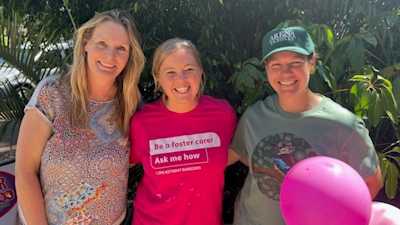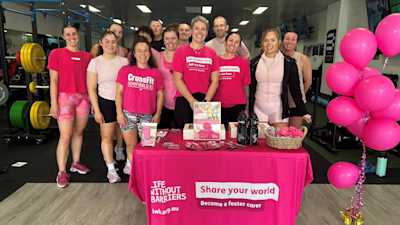So you’re interested in becoming a Carer, but you need a bit more information? We’re here to help! We’ve taken the time to answer some of your frequently asked questions and clear up some misconceptions about becoming a Foster Carer.

Image: A woman with red hair wearing a knitted jumper has her arm around a young boy wearing a striped green top as he holds a toy truck
Question #1: Can my foster child stay with me permanently?
We know it might be tempting to come to fostering hoping to keep the wonderful children who enter your home, but it’s important to note that at Life Without Barriers reunification with parents or family is always the goal when a child is brought into foster care.
The role of our Foster Carers is to provide a safe, stable and loving home for children who are unable to live safely in their own homes. Our first hope is always reunification, as we know a child has the best chance of thriving with their family.
However, there are times when reunification with parents or extended family isn't possible, in these instances, permanent placements or guardianship is explored.
Question #2: Is it hard when the children return home?
Our Foster Carers share that the goodbyes are bittersweet. Most often, our Carers are truly happy when reunification with parents or family occurs as this has always been the goal. They see themselves as one stop on the journey of helping a child find a safe, long-term place to grow up. Sometimes, this place is back with their parents or family, other times it is in a longer-term placement with someone else.
One of our amazing Carers Jane shared her experience with family reunification.
Question #3: Have all children in foster care been abused?
No, children enter foster care for a variety of reasons. Children often come from a complex and unstable family environment. While some children have suffered abuse, trauma, and neglect, this is not the case for all children.
It is important Carers know enough about a child’s history to provide the kind of stable, nurturing care they need. We will support you to learn how to best care for the child with the information at hand.
Life Without Barriers supports our Foster Carers 24/7 and provides specialised training on how to deal with complex behaviours and trauma using evidence-informed frameworks such as Therapeutic Crisis Intervention.
Question #4: Can I work and be a Carer at the same time?
Different types of Care require different levels of commitment from Carers, so there is no one size fits all answer to whether you can work and be a Carer at the same time. It depends on the age of the child you foster and the type of Foster Carer you decide to become.
Generally speaking, it is only for babies, young children and children with severe disabilities that a primary carer needs to be home full-time. For all types of Care, flexibility is important, children in care may experience more disruption with attending school or have therapeutic appointments they need to attend.
Life Without Barriers provides many different types of foster care, including short term, respite and long-term care, that can work in with your lifestyle. Foster Carers also receive a tax-free allowance to support the needs of the child placed in their care.
Question #5: Is my sexuality or relationship status a factor in becoming a Carer?
Life Without Barriers values a diverse community of Foster Carers. We are champions for equality and believe our caring community should represent those of the children needing care, and society at large. We value Carers of any sexuality or gender, and have a strong commitment to the LGBTQIA+ community. What is important to us is that you are able to provide a stable, loving home to children and young people.
Families come in all shapes and sizes, as do our Foster Families. What is important is that you have a reliable support network around you when you look to foster, which applies to all potential carers, single or in a relationship.
Meet Brodie and John, two of our wonderful Foster Dads.
Question #6: How long does it take to become a Carer?
We want to make sure that we have explored all avenues with someone before they are approved as a Foster Carer, which can take some time.
We aim for the process of becoming a Carer to be around 6 months from the time you make an application, to becoming an approved Carer if suited. This includes undertaking background checks, taking part in important training, and meeting with our assessors for assessment interviews.
Everyone's situations are different, and timing is everything when looking to become a Foster Carer, so this can take a little longer at times depending on your circumstances and availability. There are a few steps we ask you to take part in prior to commencing an application to ensure it is the right time for you, and that you are ready and suited to starting the process.
We know that the process of becoming a Carer may seem like a lengthy and involved one, which is an important part of ensuring the environments provided for vulnerable children are safe, and our Carers are prepared for the commitment they are making.
Question #7: What kind of training do I get to become a Carer?
We provide Carers with a range of learning opportunities suited to their level of experience and the needs of the children in their care. When embarking on the journey of becoming a Carer, you will take part in a workshop style training program that helps you to understand more about fostering. You will learn how children come into care, and how you can support children in care to grow, heal and stay connected to those important in their lives.
We support all Carers to have ongoing learning opportunities through multiple avenues. We offer a wide range of online training opportunities relevant to Carers through online learning, one on one coaching, and support through case management relationships. There is also face-to-face training and connection with external learning opportunities in your community.
Foster and Kinship Carers are recognised as an essential part of our team and through access to ongoing learning and development opportunities, carers can acquire and strengthen the knowledge needed to provide care in the best interests of children, inclusive of their families.


